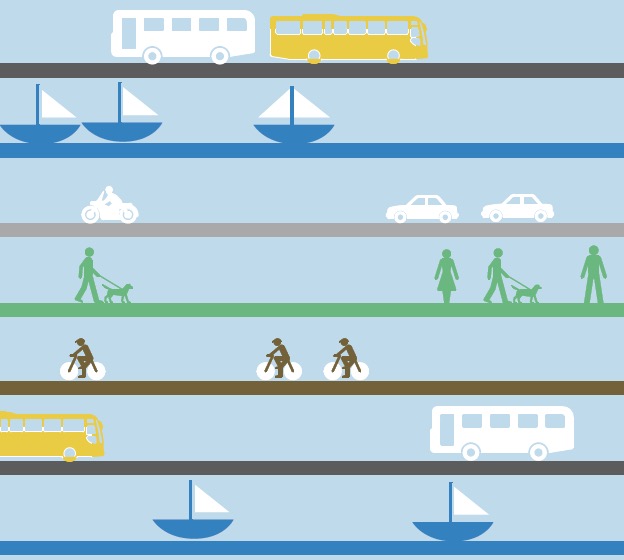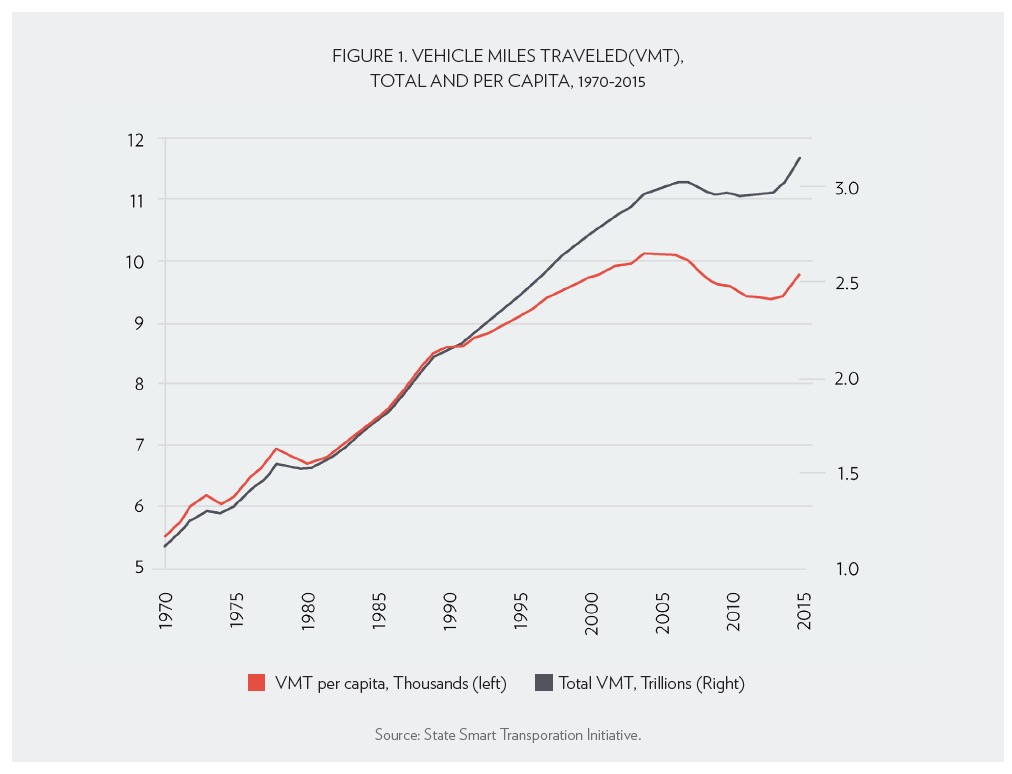THE CENTURY FOUNDATION
By Beth Osborne
Executive Summary
 We are a can-do nation. But the U.S. surface transportation program, which was created as a way of building new highways, is hopelessly outdated. Its “highways only” focus is not leading to the transportation infrastructure that America needs, and its reliance on a flat gas tax for revenue is not generating enough funding to support the roadway it does build. Furthermore, the program is unfocused, poorly understood, and often self-defeating.
We are a can-do nation. But the U.S. surface transportation program, which was created as a way of building new highways, is hopelessly outdated. Its “highways only” focus is not leading to the transportation infrastructure that America needs, and its reliance on a flat gas tax for revenue is not generating enough funding to support the roadway it does build. Furthermore, the program is unfocused, poorly understood, and often self-defeating.
The next president will need to create a true and comprehensive vision of America’s transportation infrastructure, a program to pursue that vision, and honest mechanisms to fund it. This report addresses the new principles that should serve as a foundation for a future transportation program that will enable America to meet its potential.
In sum, there are four interlocking issues that have resulted in the crisis. The first is a lack of national vision that has resulted in a program still focused on the challenge of the 1950s—building an interstate highway system. The second is a political system that has made identifying such a broad vision unlikely. The third is President Obama’s Fixing America’s Surface Transportation (FAST) legislation, which is inadequate and does not answer our major needs or point us in a constructive direction. The last is the funding limitations of a gasoline tax stuck at the level Congress set over twenty years ago.
These, in summary, are the principles that should guide a future transportation program:
Change #1: Repair the current system first. The bulk of federal funds should go to states and transit agencies for maintenance and replacement projects. Only after repair needs are addressed should money go to new projects.
Change #2: Replace a program that moves cars, trucks, and buses to one that has as its core principle moving people and goods. Thus, land development and all modes of transportation should be given an equal place beside roads in the nation’s planning and funding.
Change #3: Reward innovation through competition and performance management. We already have a small minority of programs that require projects to be submitted for analysis. A smart and rapid scaling of competitive funding would spur innovation and should consider the impact of transportation investments on the environment, the economy, and broad access to jobs and opportunity.
Change #4: Meet transportation needs with transportation funds. Funding would most easily come from an increased gas tax in the short run, but over the long-run could include strategies such as a vehicle miles traveled (VMT) tax, congestion pricing, and value capture (to be explained below). Transportation agencies that need help with a large project that overwhelms its immediate means could utilize competitive funding, federal loan programs, or self-fund. Transportation funding must get away from the gimmicks and gap fills of recent years.
Introduction
Like everything we build, transportation can be designed well, or it can be designed poorly. When designed well, transportation infrastructure creates strong connections between communities and vibrant destinations—from the Brooklyn Bridge in New York City to the bustling main street in Burlington, Iowa. When designed poorly, as U.S. Transportation Secretary Anthony Foxx has spoken so eloquently about recently, the transportation system can isolate communities, make it harder for people to reach work or school, and separate small businesses from customers.
You can see the results of past transportation mistakes across the country. Our current transportation program is designed to build highways—which it often does at a community’s expense, rather than benefit. To address a bottleneck, a bypass is built that takes customers around the community instead of to it, and businesses close down. Highways are built through residential areas, separating children from schools—so that districts must run buses to bring students to school from just a few blocks away. The way we have built our transportation system has made cars essential for even some short, local trips—and has led to transportation being the second highest household cost, after housing.
Another problem with the current program is that it has no clear purpose. In the past, politicians often got their favored projects funded by earmarks; and as long as each politician got their priority project funded, they did not concern themselves with the substance of the overall program. Now, earmarks are gone, and what remains is bipartisan confusion about the purpose of the nation’s transportation program— and the outcomes that we should expect—making it hard to effectively criticize the current system.
Nor is this program sensibly funded. There is currently a breakdown in the legislative process: Congress now delivers an ever-larger percentage of funding from often-gimmicky sources, without a serious debate about what that funding should accomplish. There have been calls for more transportation funding from politicians in both parties, but there should be an accompanying call for better results and smarter spending.3
President Obama has recently proposed a $10 tax on every barrel of oil produced for his fiscal year 2017 budget, and pledged to dedicate that revenue to programs that will provide travel options, benefit the environment, and deploy new transportation technologies. This would be a good start, but increased funding will not improve the program adequately if its priorities are not revised. The next president should lead the fight for a surface transportation program focused on moving people and freight by all effective means, instead of always favoring cars and trucks; ensure our system is safe, efficient, and maximized, before adding to it; and implement funding that rewards innovation and high performance.
Coupling increased funds with programmatic reforms and improvements may seem simple enough. But this debate has been absent from the campaigns of presidential candidates of both parties. The leaders of this country should assure the American people that they will get more from the program in exchange for additional investment. 
Download full version (PDF): New Principles for Our Transportation Program
About the Century Foundation
tcf.org
The Century Foundation is a progressive, nonpartisan think tank that seeks to foster opportunity, reduce inequality, and promote security at home and abroad.
Tags: Beth Osborne, TCF, The Century Foundation






 RSS Feed
RSS Feed